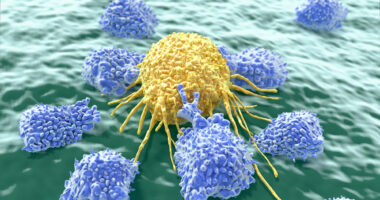Researchers Identify Potential Antibody-based Myeloma Therapy

Researchers in Japan have identified an antibody that binds to a myeloma-specific form of a common cell surface protein, called CD98 heavy chain, and that prolongs survival when given to a mouse model of multiple myeloma.
The findings were detailed in the study, “Selective targeting of multiple myeloma cells with a monoclonal antibody recognizing the ubiquitous protein CD98 heavy chain,” published in Science Translational Medicine.
“Despite the CD98 heavy chain being present on all cells, the antibody only bound to MM [multiple myeloma] cells,” Kana Hasegawa, the study’s lead author, said in a press release.
The data suggested that this selectivity may be the result of distinct chemical modifications to the CD98 heavy chain protein between normal and myeloma cells — differences that cannot be detected by gene- and protein-based analyses.
“This is significant because it means that [this] antibody can exert anti-MM effects without damaging normal host cells,” Naoki Hosen, the study’s senior author, said.
Cancer-specific cell surface antigens, or molecules with the potential to trigger an immune response, are ideal targets for anti-cancer, antibody-based therapy. Increasing efforts have focused on identifying such antigens through genetic and protein analyses.
However, these analyses are not able to detect cancer-specific, enzyme-mediated chemical modifications to proteins that may change their structure and function, so these modifications that may become promising new therapeutic targets go undetected using current techniques.
With this in mind, researchers at several universities in Japan screened more than 10,000 antibodies produced against lab-grown human myeloma cells to identify those that would specifically kill myeloma cells, but leave healthy cells unharmed.
The screening identified a particular antibody, R8H283, that bonded to a protein called CD98 heavy chain in myeloma cells, but not on healthy white blood cells or non-blood-related tissues.
CD98 heavy chain (also known as SLC3A2) is a cell surface protein found in several blood and non-blood cells. It forms a protein complex with another cell surface protein, called CD98 light chain, that increases the uptake of amino acids, the building blocks of proteins.
R8H283 specifically reacted to this CD98 heavy and light chain complex, which was abundant on myeloma cells, but also present on normal white blood cells.
They also showed that R8H283’s high specificity against myeloma cells “may reflect the differing glycosylation patterns between normal cells and MM cells,” Hasegawa said.
Glycosylation is a type of enzyme-mediated chemical modification that consists of adding a sugar molecule to proteins and fatty molecules, changing their structure and function.
The glycosylated forms of CD98 heavy chain on myeloma cells were different from those found in healthy white blood cells, “which we think explains the lack of R8H283 reactivity to normal [white blood cells],” Hosen said.
The researchers assessed the effects of treating a mouse model of multiple myeloma with R8H283. Results showed that R8H283 injections prolonged the survival of mice, suggesting that this antibody should be further assessed for use in multiple myeloma.
These findings also highlight that extensive screening of human tumor samples allows cancer-specific surface antigens that may be missed by more conventional gene- and protein-based analysis to be identified. This type of approach may be useful to broaden the number of cancer-specific targets for future therapy development.







